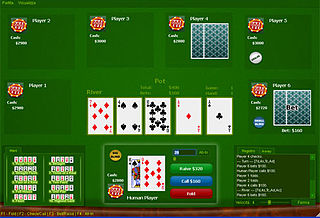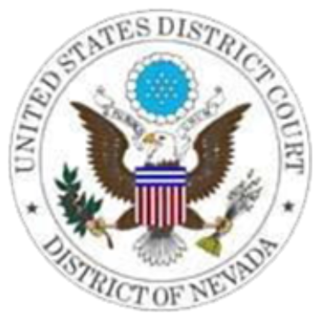
Online skill-based games are online games in which the outcome of the game is determined by the player's physical skill or mental skill. As in off-line games of skill, the definition has legal meaning, as playing games of chance for money is an illegal act in several countries.

Virginia Brown-Waite is an American politician who served as U.S. Representative for Florida's 5th congressional district from 2003 until 2011. She is a member of the Republican Party and a founder of Maggie's List.

David Albert Scott is an American politician and businessman who has served as the U.S. representative for Georgia's 13th congressional district since 2003. Scott's district includes the southern fourth of Atlanta, as well as several of its suburbs to the south and west. Before his election to Congress in 2002, Scott served as a Democratic member of both chambers of the Georgia Legislature and operated a small business. In 2007, the political watchdog group Citizens for Responsibility and Ethics in Washington named Scott one of the 25 most corrupt members of Congress. In 2023, he succeeded Glenn Thompson as ranking member of the House Agriculture Committee.

Joseph Christopher Chocola is an American businessman, lawyer, and former politician who served as the U.S. Representative from Indiana's 2nd congressional district from 2003 to 2007.

Online poker is the game of poker played over the Internet. It has been partly responsible for a huge increase in the number of poker players worldwide. Christiansen Capital Advisors stated online poker revenues grew from $82.7 million in 2001 to $2.4 billion in 2005, while a survey carried out by DrKW and Global Betting and Gaming Consultants asserted online poker revenues in 2004 were at $1.4 billion. In a testimony before the United States Senate regarding Internet Gaming, Grant Eve, a Certified Public Accountant representing the US Accounting Firm Joseph Eve, Certified Public Accountants, estimated that one in every four dollars gambled is gambled online.

Anne LaBarr Duke is an American former professional poker player and author in cognitive-behavioral decision science and decision education. She holds a World Series of Poker (WSOP) gold bracelet from 2004 and used to be the leading money winner among women in WSOP history, and is still in the top five as of April 2023, despite being retired from poker, last cashing at a tournament 2010. Duke won the 2004 World Series of Poker Tournament of Champions and the National Heads-Up Poker Championship in 2010. She has written a number of instructional books for poker players, including Decide to Play Great Poker and The Middle Zone, and she published her autobiography, How I Raised, Folded, Bluffed, Flirted, Cursed, and Won Millions at the World Series of Poker, in 2005. Duke also authored two books on decision-making, Thinking in Bets: Making Smarter Decisions When You Don't Have All the Facts, and How to Decide: Simple Tools for Making Better Choices.

Joseph Russell Pitts is a former American politician who served as the U.S. representative for Pennsylvania's 16th congressional district from 1997 to 2017. He is a member of the Republican Party. The district was based in Lancaster and Reading and included much of the Amish country. It also included the far southwestern suburbs of Philadelphia in Chester County.
Online gambling is any kind of gambling conducted on the internet. This includes virtual poker, casinos, and sports betting. The first online gambling venue opened to the general public was ticketing for the Liechtenstein International Lottery in October 1994. Today, the market is worth around $40 billion globally each year, according to various estimates.

In the United States, gambling is subject to a variety of legal restrictions. In 2008, gambling activities generated gross revenues of $92.27 billion in the United States.

bwin Interactive Entertainment AG, formerly known as Betandwin, is an Austrian online betting brand acquired by Entain PLC. The group operated under international and regional licences in countries like Gibraltar, the Amerindian reserve of Kahnawake (Canada), and Belize; and Germany, Italy, Mexico, Croatia, Austria, France, and the United Kingdom in Europe. Bwin offered sports betting, poker, casino games, and soft and skill games, with most revenue coming from poker and sports betting. Bwin had over 20 million registered customers in more than 25 core markets. Competence centres were located in Vienna, Stockholm, and Gibraltar.

The Unlawful Internet Gambling Enforcement Act of 2006 (UIGEA) is United States legislation regulating online gambling. It was added as Title VIII to the SAFE Port Act which otherwise regulated port security. The UIGEA prohibits gambling businesses from "knowingly accepting payments in connection with the participation of another person in a bet or wager that involves the use of the Internet and that is unlawful under any federal or state law." The act specifically excludes fantasy sports that meet certain requirements, skill games, and legal intrastate and intertribal gaming. The law does not expressly mention state lotteries, nor does it clarify whether interstate wagering on horse racing is legal.
The proposed Sanctity of Life Act was a bill first introduced in the United States House of Representatives by Rep. Steve Stockman (R-TX) on July 20, 1995, and co-sponsored by Rep. Barbara Cubin (R-WY). It was reintroduced with similar text by Rep. Ron Paul (R-TX) in 2005 in the 109th United States Congress, 110th United States Congress, 111th United States Congress, and the 112th United States Congress. The repeatedly introduced bill sparked advocacy from anti-abortion activists and opposition from abortion-rights activists. The bill has never become law.

Baxter v. United States, 633 F. Supp. 912, was a federal tax refund case, decided in 1986, regarding the U.S. federal income tax treatment of the gambling income of a professional gambler. Because of this case, gambling winnings in the United States can in certain cases be treated as business income for federal income tax purposes. This means that in some cases expenses and losses can be deducted from gambling winnings in arriving at the net earnings from self-employment, and that winnings can be placed into retirement funds.
The Southern District of New York (SDNY) Action Against Online Poker Players was a legal action taken by the Department of Justice in an effort to crack down on online poker. The action occurred around June 8, 2009, when the government ordered four banks to freeze over 34 million dollars in payments owed to about 27,000 poker players. According to the Poker Players Alliance, a grass-roots organization for poker players, federal prosecutors ordered Citibank, Wells Fargo and Goldwater Bank and Alliance Bank of Arizona to freeze the accounts of Allied Systems and Account Services. Allied Systems and Account Services are two of the account-management companies that Full Tilt Poker, Absolute Poker, Ultimate Bet and PokerStars use for the disbursement of funds.

The Internet Gambling Regulation, Consumer Protection, and Enforcement Act was a proposed 2009 bill in the United States House of Representatives that is intended "to provide for the licensing of Internet gambling activities by the Secretary of the Treasury, to provide for consumer protections on the Internet, to enforce the tax code, and for other purposes." The bill was originally introduced by Representative Barney Frank (D-MA) on June 12, 2009 and as of July 20, 2009 had bipartisan support from 47 co-sponsors. The bill was held in the House Financial Services Committee.

The United States Federal Trade Commission (FTC) has been involved in oversight of the behavioral targeting techniques used by online advertisers since the mid-1990s. These techniques, initially called "online profiling", are now referred to as "behavioral targeting"; they are used to target online behavioral advertising (OBA) to consumers based on preferences inferred from their online behavior. During the period from the mid-1990s to the present, the FTC held a series of workshops, published a number of reports, and gave numerous recommendations regarding both industry self-regulation and Federal regulation of OBA. In late 2010, the FTC proposed a legislative framework for U.S. consumer data privacy including a proposal for a "Do Not Track" mechanism. In 2011, a number of bills were introduced into the United States Congress that would regulate OBA.

United States v. Scheinberg, No. 1:10-cr-00336 (2011), is a United States federal criminal case against the founders of the three largest online poker companies, PokerStars, Full Tilt Poker and Cereus, and a handful of their associates, which alleges that the defendants violated the Unlawful Internet Gambling Enforcement Act (UIGEA) and engaged in bank fraud and money laundering to process transfers to and from their customers. A companion civil case, United States v. Pokerstars, et al., 11 Civ. 2564 (2011), included Full Tilt and Cereus, Ultimate Bet, Oldford Group, Rational Entertainment Enterprises, and many others as defendants and sought the recovery of forfeiture equalling approximately $3 billion in assets belonging to the companies. After the indictment was unsealed on April 15, 2011, a date quickly dubbed Black Friday by the online poker community, PokerStars and Full Tilt stopped offering real money play to their United States customers. Three years after the start of the poker boom in 2003, the U.S. Congress passed UIGEA to extend existing gambling laws into cyberspace. The law made processing payments for illegal online gambling a crime; however, the defendant companies remained in the U.S. market in the belief that the law did not cover poker. A former payment processor for the companies turned state's evidence after initially being charged with violating UIGEA himself. On September 20, the civil suit was amended claiming individual fraud by Howard Lederer, Chris Ferguson, and Rafael Furst.
The poker boom was a period between 2003 and 2006, during which poker, primarily no-limit Texas hold 'em, but also other variations, became considerably more popular around the world. During the boom years, the online poker player pool at least doubled in size every year.

The Ending Federal Marijuana Prohibition Act is a series of federal marijuana decriminalization bills that have been introduced multiple times in the United States Congress.
Geolocation is an important technology in the online gambling industry. Different countries, states and jurisdictions have different laws ranging from complete prohibition to no laws at all, making online gambling de facto legal and unregulated. To determine whether a potential online gambler should be allowed to deposit, play or even view an online casino it is necessary to determine the individual's physical location.













